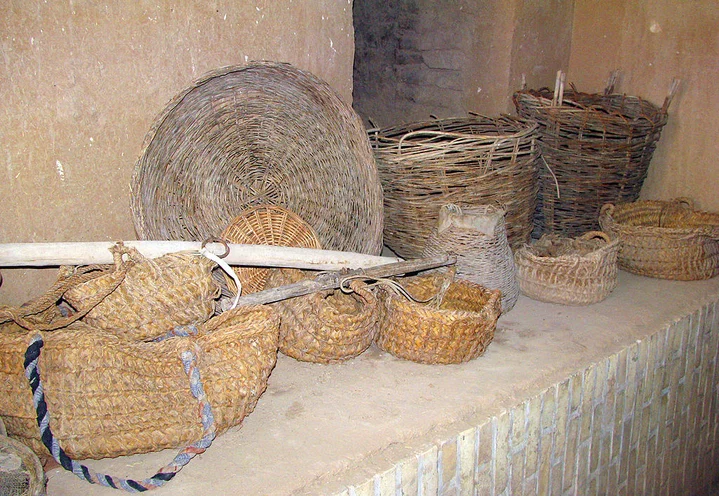“Instead of pursuing a career as a plant eater, carnivore or generalist, [our ancestors] tried a strange, dual strategy: some would hunt, others would gather, and they’d share whatever they acquired.”
— Herman Pontzer, evolutionary anthropologist. Scientific American January 2023
###
Every now and then, I’ll stumble upon a new list of [hu]mankind’s greatest inventions. Topping the list are usually such traditional favorites as fire, toolmaking, agriculture, the wheel, ships, the printing press, not to mention flush toilets and smartphones. I’ve long held that our greatest invention, one that necessarily had to precede all these and made them all possible, was something I think all those list-makers overlooked:
Baskets.
Until around three million years ago, our ancestors got their life-giving calories by foraging individually for food, the same as the living apes do today: eating fruits and leaves straight off the trees, garnished with the occasional ant or small rodent. Except the youngsters, who depend on their mothers for the first years of life—so they’re limited to just one or two offspring at a time, since more would beyond mom’s capacity to nurse. Unlike human children, young chimps, gorillas, orangutans and other primates are independent by the time they’re three or four years old. (I know humans still dependent on their folks into their twenties and thirties!)
What changed was sharing. At some point, individual meals became group meals, as our foremothers gathered and our forefathers hunted, bringing the food back to camp and divvying up the spoils. That switch, individual to communal, happened about 100,000 generations ago, say three million years, and it preceded everything else that made us human: toolmaking, fire, language, the whole set of skills that culminated in us. (Including the next big thing, agriculture, but that had to wait until about 10,000 years ago.)
Dabiri-e VAZIRI, CC BY-SA 4.0, via Wikimedia Commons.
So what made the switch possible, from solitary eating right where the food was, to communal noshing back at camp? The basket. Especially for foragers. Just how many roots or pieces of fruit can you carry in your hands? Not a lot. It takes some sort of container if you’re going to bring a worthwhile amount back to where the gang is hanging. Hence baskets. Easily made, of course—a folded up leaf, a hollow log, a few reeds or sticks woven together—but a basket increases your carrying capacity what, ten times? A hundred times?
(If you don’t believe me, try shopping at Winco without a basket or cart.)
According to Herman Pontzer (quoted above), the cooperative approach to food-gathering “placed a premium on intelligence, and over millennia brain size began to increase.” So the invention of the basket led to big brains which led to everything else that big brains figured out.
There was, however, a downside. (Isn’t there always?) Big brains have a cost in terms of calories—fully 20% of the food we eat goes to powering them, not to mention our big, hungry babies who need to be fed for a decade or more. We humans figured out how to be more efficient food gatherers than other apes, but then we blew it by creating a lifestyle that needs many more calories than they do. And that goes for even the least “civilized” of our species, the few human hunter-gatherers still alive today, the Hadza people of northern Tanzania. Turns out, our closest primate relatives spend half as much energy per day acquiring food as do the Hazda.
But then apes don’t have baskets.

CLICK TO MANAGE